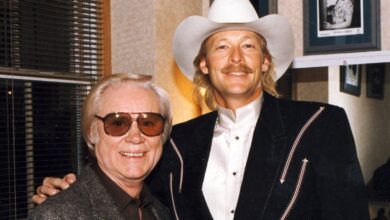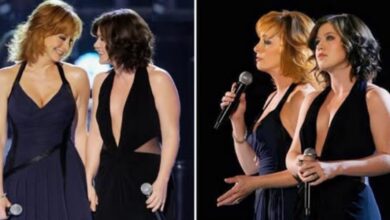Bee Gees’ “Massachusetts” Finds New Intimacy on Michael Parkinson’s Show in 1981
In 1981, over a decade after its initial release, the Bee Gees revisited their 1967 classic “Massachusetts” with a stripped-down, acoustic performance on the Michael Parkinson Show. The appearance wasn’t just a nostalgic trip—it was a masterclass in harmony and songwriting, revealing new layers of intimacy in one of their earliest hits. With just two guitars, three voices, and the haunting simplicity of the lyrics, the performance gave audiences a raw, heartfelt experience that transcended time.
The Bee Gees—Barry, Robin, and Maurice Gibb—had already solidified their place in pop history long before this television appearance. Born on the Isle of Man and raised in Manchester before moving to Australia, the brothers honed their talents from childhood. Their harmonies were instantly recognizable, and their songwriting proved adaptable across styles, from orchestral pop to disco. What made them stand apart was not only their familial synchronicity but their relentless reinvention across decades.
“Massachusetts” was written during their return to the UK from Australia and served as a poignant commentary on the social movements of the late ’60s. The lyrics tell the story of someone leaving the excitement and chaos of San Francisco’s counterculture to return home—a narrative that flew in the face of the popular “flower power” ethos of the time. The brothers reportedly came up with the idea while reflecting on the cultural upheaval around them, writing a song that turned the usual narrative of escape on its head.
The original recording took place at IBC Studios in London and featured lush orchestration courtesy of Bill Shepherd. Robin Gibb’s mournful lead vocal carried the emotional weight, while Barry and Maurice’s harmonies lifted the song to the heavens. It was produced under the watchful eye of Robert Stigwood, who helped channel their raw energy into a polished, radio-ready gem. The use of soft, baroque-style instrumentation combined with their haunting vocals made “Massachusetts” feel both timeless and contemporary.
Upon its release, the song was an immediate success. It became the Bee Gees’ first number one hit in the United Kingdom and charted in multiple countries, including Germany, Japan, and Australia. The track sold over five million copies worldwide. At a time when British music was being shaped by both rock bands and psychedelic experimentation, “Massachusetts” stood out for its emotional restraint and melodic clarity.
Culturally, the song marked a shift. While many bands of the era were embracing flamboyance and rebellion, the Bee Gees offered introspection and a return to values of home and belonging. Their nuanced take on youth and identity resonated with a broad audience, bridging generational divides and expanding their reach well beyond pop fans.
By the time of their 1981 performance on Parkinson, the Bee Gees were global superstars, thanks in large part to the disco-era dominance of Saturday Night Fever. Revisiting “Massachusetts” during this period showed their willingness to reconnect with their roots. Seated close together with acoustic guitars, the performance was a return to basics, revealing the bones of their songwriting genius without the gloss of production.
The intimate rendition cast new light on the song’s subtle melancholy. Robin’s lead vocals were even more vulnerable than in the studio version, while Barry and Maurice’s harmonies sounded like echoes from a distant past. It wasn’t just a performance—it was a conversation between three brothers about where they had been and how far they had come.
Over the years, “Massachusetts” has been covered by artists ranging from Alton Ellis to The Seekers. But few renditions capture the emotional weight of the Bee Gees’ original—or their acoustic Parkinson version. Stripped of its orchestral backdrop, the song’s bare melody and lyrics took center stage, reminding viewers of its simple, enduring power.
At the time of the performance, the Bee Gees were enjoying renewed acclaim, but they were also facing criticism and industry fatigue due to their association with disco. Returning to a ballad like “Massachusetts” allowed them to reassert their identity as serious songwriters, not just icons of a genre in decline. It was a moment of reclamation and reflection.
Today, “Massachusetts” remains a pillar in the Bee Gees’ catalog. It’s still played on classic pop and oldies stations, and it continues to appear in retrospectives and greatest hits collections. The 1981 performance breathed new life into the track, reminding fans and critics alike that the Bee Gees’ artistry was always rooted in emotional storytelling.
The song’s acoustic presentation on Parkinson also influenced later acoustic television performances by major artists, setting a template for how to revisit past material with grace and vulnerability. In that way, the Bee Gees helped pioneer the now-popular “unplugged” format that dominated the 1990s.
Though Maurice passed away in 2003 and Robin in 2012, the memory of moments like this performance ensures their legacy lives on. It wasn’t just about singing a hit—it was about showing the soul behind the song.
Ultimately, the Parkinson appearance crystallized why “Massachusetts” has endured. Beyond its chart success and beautiful arrangement, it carries the rare ability to shift with time, to feel just as relevant and moving decades later. For a brief moment in 1981, in front of a quiet audience and with nothing but their voices and guitars, the Bee Gees reminded the world of what music, at its best, truly is: timeless, human, and heartbreakingly honest.



